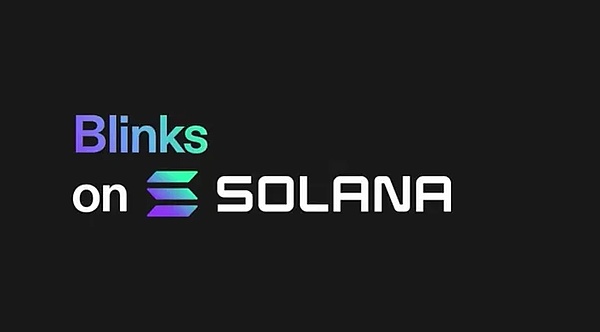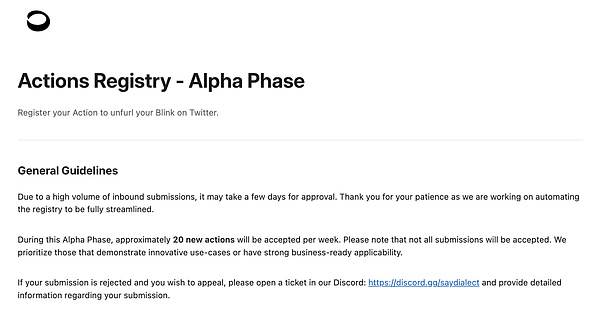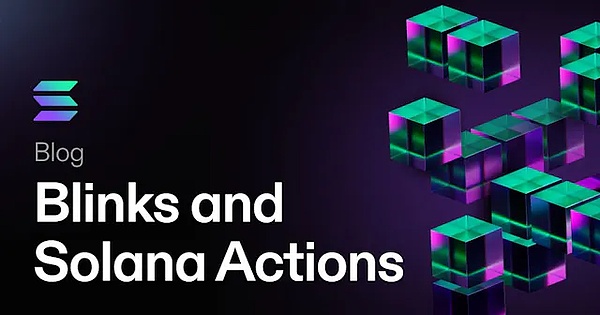Source: Beosin
Recently, the Blink application in the Solana ecosystem has risen rapidly, and its function of embedding on-chain operations on Twitter has attracted widespread attention.
Solana Blink is a new function that embeds social media platforms (such as X platform, formerly Twitter) to directly perform blockchain operations. Users can complete on-chain operations such as swaps, mints, and donations by clicking on tweets. This convenience lowers the user's usage threshold and greatly improves the accessibility of blockchain technology.
Why Solana Blink suddenly rose
The core innovation of the Solana Blink application lies in the seamless integration of blockchain operations with social media. Traditionally, users need to enter a dedicated DApp or wallet platform to perform blockchain operations, but Blink has greatly simplified the process by embedding these operations into the social media that users use daily. Specifically, users can directly perform operations on the blockchain, such as exchanging cryptocurrencies, minting NFTs, or making donations, by clicking on a link or button in a specific tweet on Twitter.
On the eve of Blink's official release, the SEND project was already active on Twitter, quickly attracting a lot of attention by showing Blink's various application scenarios. The SEND project successfully stimulated market speculation and attracted a large number of investors through meticulous market operations, such as Twitter hinting at Solana's big move, the issuance of limited NFTs, and lucky draws.
The support of Solana founder Toly also provided a huge boost to the SEND project. He pinned the 100 Blink use case tweets proposed by the SEND team on Twitter, publicly promoting the project and increasing the project's credibility and exposure. This high-level support not only improved the project's image, but also further enhanced users' trust in the Blink application.

The Importance of Security Audits from Solana Blink
With the rapid rise of Blink applications and SEND projects, their security issues have also attracted widespread attention. For such innovative platforms and projects, security audits are particularly important. Here are the main security challenges faced by Blink and SEND projects:
Smart Contract Security
Blink and SEND projects rely on smart contracts to perform on-chain operations. Smart contracts are self-executing contracts whose terms and conditions are written directly into the code and run automatically on the blockchain, which means that any code vulnerabilities or errors can have serious consequences. Smart contracts that have not been fully audited may result in financial losses, data leaks, or even the complete collapse of the system. Therefore, conducting a comprehensive security audit of smart contracts to discover and fix potential vulnerabilities is key to ensuring the security of the platform.
User Privacy Protection
Embedding on-chain operations on Twitter may involve users' personal data and transaction information. Although blockchain technology itself has a certain degree of anonymity, when combined with social media platforms, users' privacy protection faces new challenges.
For example, a user's Twitter account information may be associated with their blockchain transaction records, forming a chain that can be traced. Therefore, ensuring the security and privacy protection of this data is key. Security audits need to evaluate the platform's measures in data encryption, access control, and privacy protection to ensure that users' personal information will not be abused or leaked.
Transaction Verification and Fraud Prevention
Due to the convenience of operation, users may be more susceptible to fraud or improper operations. Malicious users may take advantage of the convenience of the platform to induce other users to make unnecessary transactions or participate in fraudulent activities. Attackers may also create fake Solana Blink and SEND project websites or applications to trick users into entering private keys or mnemonics.
Auditing needs to ensure the legitimacy and authenticity of each transaction to prevent improper operations and fraud. This includes reviewing transaction logic, detecting abnormal transaction behavior, and evaluating and optimizing the platform's anti-fraud mechanism.
False Propaganda and Rug Pull
Blink and SEND projects have gained a lot of traffic through Twitter. While it has become convenient for users to interact with the Solana chain, it is also easy for false propaganda projects to take advantage of them: they can use Blink and SEND projects to easily create Meme projects and attract a lot of investment in a short period of time, and then developers quickly withdraw, causing investors to lose money. Eventually, Rug Pull is formed.
Currently, in order to avoid such problems, Solana has officially restricted the creation and use of Blink. If a project wants to release Blink, it needs to fill out an application form at https://dial.to/register. Only after the application registration is approved can the project create a Blink link.

Blink Application Form
According to Blink's official documentation, any project in the Solana ecosystem can create Blink in the future, where user security is still a very big challenge.
The Solana Blink and SEND projects demonstrate the key role of the audit industry in the security of emerging technologies and platforms. Through in-depth analysis and effective security audits, the audit industry can provide solid guarantees for the development of blockchain technology and promote innovation and sustainable development.

Security audits are not only about finding problems, but more importantly, they support the new and sustainable development of the platform by solving problems. For innovative projects like Solana Blink and SEND, security audits can help them maintain security during their development and avoid negative impacts caused by security issues. By providing continuous security assurance, the audit industry can help platforms achieve long-term and stable development and promote continuous innovation in blockchain technology.
The rapid rise of the Solana Blink application demonstrates the huge potential of blockchain technology on social media platforms. However, with the popularity of these innovative applications, their security issues cannot be ignored. Security audits play an indispensable role in ensuring platform security, enhancing user trust, promoting industry standardization, and supporting innovative development. Through in-depth security audits, the blockchain industry can continue to promote technological innovation and widespread popularization of applications on the basis of ensuring security and achieve sustainable development goals.
 JinseFinance
JinseFinance
 JinseFinance
JinseFinance JinseFinance
JinseFinance JinseFinance
JinseFinance JinseFinance
JinseFinance JinseFinance
JinseFinance JinseFinance
JinseFinance JinseFinance
JinseFinance JinseFinance
JinseFinance JinseFinance
JinseFinance JinseFinance
JinseFinance